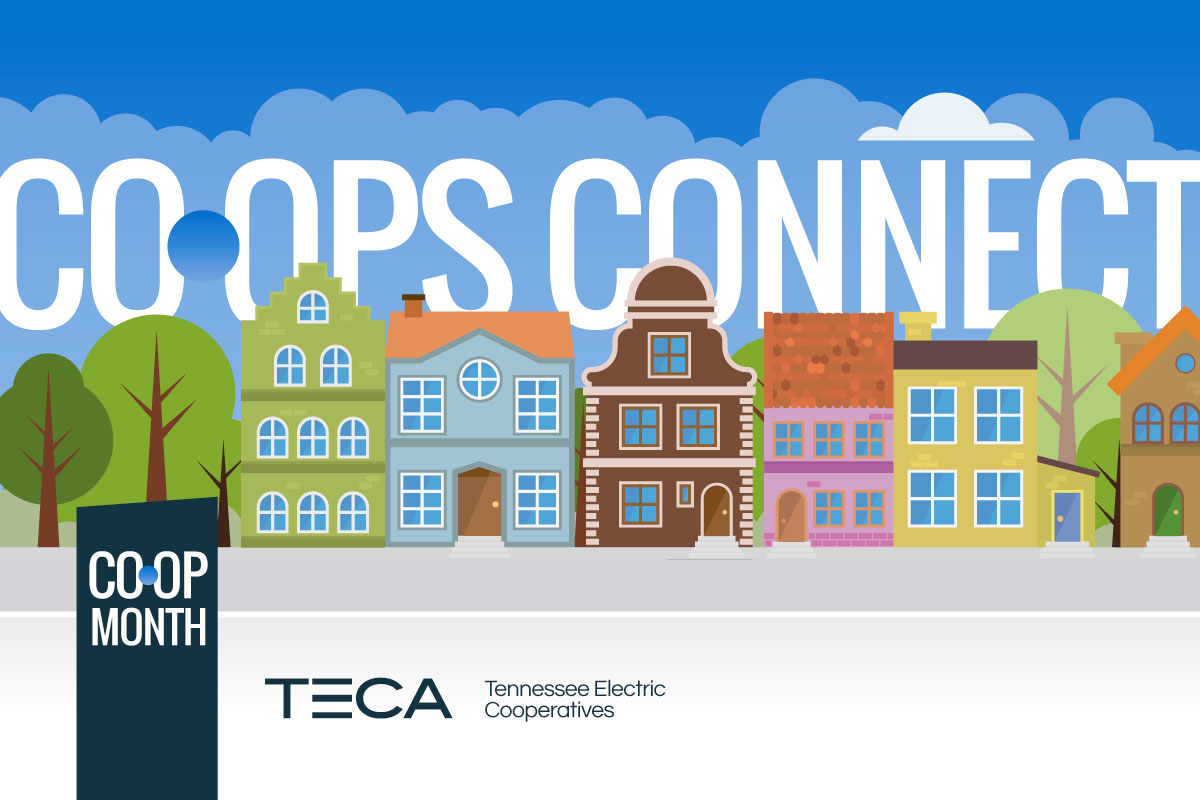The importance of indoor air quality at home, at work and in the classroom
Did you know that, on average, Americans spend a whopping 90% of their time indoors, and that the concentrations of some pollutants may be up to five times higher indoors than outdoors? Both short- and long-term exposure to indoor air pollution can lead to a range of health issues including headaches, fatigue, respiratory diseases, heart disease, cognitive deficits and cancer.
Ready for some good news? Take a deep breath: Healthy indoor air quality has been associated with enhanced cognitive performance, better decision-making and increased
productivity. That’s why TVA EnergyRight® and your local power company are ready to help you improve indoor air quality at home, on the job and at school.
What makes indoor air unhealthy?
Contaminants such as allergens, carbon monoxide, chemicals, radon, smoke and mold all
contribute to poor indoor air quality. There are plenty of potential polluters, too, such as gas
ovens and ranges, wood-burning fireplaces, cleaning solutions, chemicals used in certain paints
and furnishings, outdated heating and air conditioning systems, damp basements, pet dander
and dirty ventilation systems.
What do you need for good air quality?
Fortunately, the recipe for cleaner, healthier indoor air is simple: adequate ventilation and
controls for pollution, temperature and humidity levels. Read on for tips and resources that can
dramatically improve the air you breathe, wherever you may be.
Three ways to improve air quality at home … and save money.
1. Minimize pollutants.
An easy way to improve air quality is to cut down on pollutants like carbon monoxide, radon or harsh chemical cleaning products.
Carbon monoxide is a poisonous gas that can build up quickly indoors. Have your gas appliances, chimneys, and fireplaces or wood stoves checked annually by a professional. If you haven’t had your home checked for radon, a natural radioactive gas that can build up in your home, now’s the time! According to the Tennessee Department of Environment and Conservation (TDEC), radon is a very serious problem in our state.
Certain cleaning products may also contain harmful chemicals and fumes that can linger in the air; glass cleaners, bleach, air fresheners and cleaning sprays are common culprits. Try to use non-toxic cleaning products whenever possible. For a green, cost-effective clean, we’re partial to distilled white vinegar, baking soda and pet-friendly essential oils.
Find a contractor who can help make sure your home’s ventilation systems are working well and that your air quality is within a healthy range.
2. Tend to your heating and cooling system.
The average lifespan of an HVAC system is 15-20 years. If you’re approaching the end of your unit’s functional lifespan, investing in a new one is an excellent way to improve air quality and lower energy costs.
Not ready for a new system? Be sure to replace your air filter regularly. Clean filters do a better job of trapping dust, dirt, and airborne particulates. Plus, they’re easier on your HVAC system, helping it work more efficiently and last longer.
Keeping your HVAC unit in tip-top shape is another good way to improve indoor air quality. You can knock out your electric HVAC tune-up with a $50 rebate from TVA EnergyRight. Be sure to explore all our rebates on HVAC systems, duct systems, air sealing and more.
EnergyRight.com/Rebates
3. Get your ducts in a row.
Excellent ventilation in your home can reduce the concentration of indoor pollutants. Install an externally-vented exhaust fan in your kitchen and bathrooms, and open windows regularly to circulate fresh air. You can also get your duct system professionally cleaned to keep clean air flowing, seal cracks or holes in ductwork and increase the efficiency of your HVAC system. Don’t know who to hire for ductwork deep-clean or fan installation? Try a TVA-vetted contractor from our Quality Contractor Network.
EnergyRight.com/Quality-Contractor-Network
Three ways to improve air quality at work and in the classroom.
1. Upgrade your HVAC system.
Much like the heating and cooling systems in your home, commercial HVAC systems have a huge impact on indoor air quality. Upgrading your building’s HVAC system can significantly lower your monthly energy bill, help you achieve energy efficiency goals, reduce maintenance costs and control seasonal spikes in energy use while improving workplace or classroom comfort and air quality.
And guess what? TVA EnergyRight and local power company partners are offering business & industry customers incentives on qualifying HVAC equipment.
EnergyRight.com/business-industry/incentives/hvac
Thanks to a partnership with the Tennessee Department of Education’s Energy Efficient School Initiative, TVA EnergyRight and local power companies are also helping public schools throughout the region save on energy costs and improve indoor air quality. Participating public schools learn about saving energy and receive grants to make much-needed energy upgrades, fostering happier, healthier learning environments.
EnergyRight.com/business-industry/school-uplift
2. Purify with photosynthesis.
Treat yourself to a plant or two and infuse a breath of fresh air into your workspace or classroom. Science alert! How do plants purify the air? During photosynthesis, plants convert carbon dioxide (exhale!) into fresh oxygen (inhale!). The process can also remove toxins commonly found in office furniture and heavy-duty cleansers – like formaldehyde, benzene and trichloroethylene – which makes a pretty plant pretty amazing.
3. Reduce emissions
If your work environment is less desk and more distribution, then you may be familiar with the chug-chug of internal combustion forklift engines. Lower emissions and elevate workplace air quality by switching from gas to electric forklifts.
EnergyRight.com/business-industry/incentives/electric-forklifts
Whether you’re at home, at work or hitting the books, TVA EnergyRight and your local power company are here to help you breathe easy. Take the next step toward improving indoor air quality today! Explore all of our resources at EnergyRight.com.






